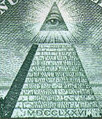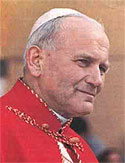You state "I'm resistant to what I think is a reckless characterization of America as some kind of 'Masonic experiment.'" Well, regardless if you admit it or not, it's still a "fact," which you must sooner or latter admit to. Do some reading of both Catholic and non-Catholic sources my friend, which were provided to you in the comments on one of your earlier posts.Brother, I beg you, the next time you visit D.C, open your eyes, OPEN your eyes. The entire city was designed by Masons (layout of the streets, all the significant buildings, memorials, White House, Capital Bldg, etc.). If the founders were so intent in making the physical structure of our nation's capital Masonic, is it not reasonable to assume that Freemasonry also influenced their beliefs & therefore their writings? Read any number of a dozen plus books I referenced to you and then let's chat.
In short, study what the Church teaches about Freemasonry. For example (one of hundreds), Pope Leo XIII in his encyclical letter Humanum Genus (1884) equated Freemasonry with the Kingdom of Satan. Study what any number of saints had to say about Freemasonry, i.e. St. Maximilian Kolbe, etc. Refer to what the Sacred Congregation for the Doctrine of the Faith (B16 himself) had to say about Freemasonry in 1983. The list goes on and on. . . .
Which leads to the following point and I'm not the first to make it. It is this - Errors in the understanding of who and what God (or more appropriately god) is for our Masonic Founding Fathers (Washington, Jefferson, Franklin, etc.) led to errors in many other areas of their thought, including their understanding of religious freedom, which are spelled out in our governing documents. The logic of the Founding Fathers is a mixed-bag of Masonic, Enlightenment, and classical principles. I refer you to Kraynak's and Craycraft's books on this topic.
What's beyond dispute is the fact that the Catholic faith and Freemasonry are irrevocably opposed -- the various encyclicals of the Popes not to mention the reaffirmation by the Congregation of the Doctrine of the Faith prohibiting membership in the Masonic order is testament to that.
However, David contends that "the logic of the Founding Fathers is a mixed-bag of Masonic, Enlightenment, and classical principles" -- and that is precisely the question that I'd like to look into during the course of my reading: to what degree the philosophical foundations of the American experiment was tainted by Enlightenment [and/or Masonic] presuppositions?
This of course calls for a serious investigation, as well as giving consideration to the research of Michael Novak (On Two Wings: Humble Faith & Common Sense at the American Founding), John Courtney Murray, Jacques Maritain, and precursors like Alexis de Tocqueville (Democracy in America) who contend that the founding fathers demonstrated an openness to religion and religious freedom -- in some cases in spite of their deism, unitarianism, and membership as Masons -- such that liberal democracy as embodied in the "American experiment" isn't necessarily antagonistic to the Catholic faith.
With respect to the above, I find Chris Burgwald's comments very helpful here:
I think my own position is distinct from both of yours, although closer somewhat to David's. . . .
To me, Masonry is just ritualized Enlightenment doctrine; it's the latter that is the real issue. And I think there's little doubt that our nation was founded on what are ultimately Enlightenment principles.
And yet the reverse is not necessarily the case: one can be a Freemason (in the sense of visible membership) without subscribing in full to the Enlightenment worldview, just as one can be a Catholic (in the sense of visible membership) without subscribing in full to the Catholic worldview.
My point here is that determining the worldview of our nation's founding fathers is not as simple as seeing which organizations they belonged to.
NB: I do believe that many or most of our Founders had the Enlightenment worldview; I am only saying that this is not determined by noting that they were Masons and saying nothing more.
I must admit one of the issues I have difficulty with in discerning what to read in Freemasonry is the notable abundance of conspiracy theorizing by the fringe right (Protestant and Catholic). Apart from the papal encyclicals on Freemasonry my past encounter with the topic has largely been the fevered mutterings of radtrads about Vatican II being a "Talmudist-Masonic" infiltration of the Catholic Church.
Likewise, the reason I went ahead with Whalen's Christianity and American Freemasonry as my first choice was due to Sandra Miesel's criticism of Behind the Lodge Door in her article for Crisis magazine (Swinging at Windmills Dec. 2, 2002) on the Catholic fringe:
In 1776, what Jacob calls "a radicalized mutation of the Masonic gene" brought forth the Illuminati, founded by canon law professor Adam Weishaupt. (Febrile minds imagine Jews having had a hand in the matter.) These mystic masterminds of Masonry were closed down by the Bavarian police in 1785 but are still imagined to lurk in the corridors of power.Being generally liberal in politics, Masons often participated in revolutions. The Masonic affiliations of Washington, Franklin, and other founding fathers mean that, for some traditionalist Catholics, the United States has no right to exist. Or so says The Remnant’s top writer, Solange Hertz, author of The Star-Spangled Heresy: Americanism and an implacable foe of the Judeo-Masonic peril. (For good measure, Hertz has denounced Mother Teresa as a New Ager.)
Other critics, such as Ted Flynn in Hope of the Wicked, ferret out Masonic symbolism in our national emblems because Masons were involved in the designs. He reads the American Eagle as a Masonic phoenix and the Statue of Liberty as a Masonic goddess. Flynn’s source, Ralph Epperson, tries to make former President Ronald Reagan’s inauguration facing the Washington Monument into Masonic sun worship.
Because the Masons claim the number 13, it must be theirs—everywhere. But units of 13 in our Great Seal refer to nothing more ominous than the 13 original colonies, which existed for 44 years before the Revolution—rather a long wait to match a Masonic timetable. The alarming All-Seeing Eye also happens to be an old sign of the Holy Trinity, found in Baroque churches. (One breathlessly awaits revelations about the AOL logo.)
But it was the French, not the American, Revolution that stamped the Masons and their Illuminati masters as experts in rebellion, according to theories separately propounded by ex-Jesuit Augustin de Barruel (1741-1820) and Scotsman John Robison (1797-1798) and still popular in paranoid circles. Contemporary histories prefer to see people with radical sympathies becoming Masons rather than Masons becoming radicals. . . .
As for America, Behind the Lodge Door by Paul Fisher looks at the sorry record of American Masons in outbreaks of nativism, the Ku Klux Klan, and church-state relations. But Fisher, who does not link Masonry with the Jews, far exceeds his evidence to connect them with ancient cults, Illuminati plots, and the assassination of President Kennedy. William Wahlen’s Christianity and American Freemasonry is a far more sensible Catholic book on the subject.
That Meisel's article is hosted on TCRNews.com leads me to presume that Stephen also gives credence to Miesel's critique.
Although some of the criticisms offered by reviewers lead me to suspect his methodology (relying heavily on innuendo and speculation), I will likely give Behind the Lodge Door a read as David personally recommended it. But in exploring this topic my concern is to chart a careful path: looking to the papal encyclicals and serious, academic studies of this issue -- and my wariness of tenuous arguments and conspiracy theories. From what I've witnessed on the web, those who indulge in the such flights of imagination end up considerably "untethered" from reality.

Incidentally, it is questionable whether the Great Seal of the United States -- which Stephen Hand posts on his blog indicating the Masonic origins of the United States -- has any Masonic symbolism. According to Wikipedia:
Many consider the eye atop the pyramid to have its origins in Masonic iconography. However, the icon is not a Masonic symbol, nor designed by a mason. Among the Great Seal committee, only Benjamin Franklin was a Mason, but his ideas were not adopted by the committee.The all-seeing eye was a well-known classical symbol of the Renaissance. The all-seeing eye of God is mentioned several times in the Christian Bible. The eye in a triangle design originally was suggested by Pierre Eugene DuSimitiere, and later heraldist William Barton improved upon the design. In Du Simitière's original sketch, two figures stand next to a shield with the all-seeing pyramid above them. The August 20, 1776 report of the first Great Seal Committee describes the seal as "Crest The Eye of Providence in a radiant Triangle whose Glory extends over the Shield and beyond the Figures."
More detailed explanation from a masonic website on the origins of the seal eschews any claim to Masonism, asserting that "The Great Seal of the United States is not a Masonic emblem, nor does it contain hidden Masonic symbols."
Likewise, masonicinfo.com points out that ""The first 'Official' use and definition of the all-seeing eye as a Masonic symbol seems to have come in 1797 with The Freemasons Monitor of Thomas Smith Webb - 14 years after Congress adopted the design for the seal."
For information as to the actual symbolism of the seal, see Official Heraldry of the United States.
(Of course, the fact that nothing is said publicly of the Masonic symbolism of the Great Seal -- and that the Masons eschew its significance -- may itself be part of the grand conspiracy).

